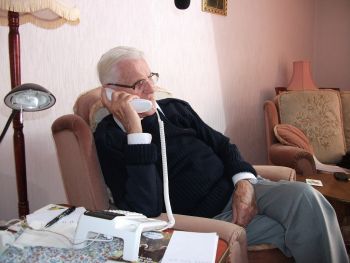The loneliness epidemic - can churches help?

In 2012, there were 26.4 million households in the UK, of which 29 per cent consisted of only one person, according to data from the Office for National Statistics. Perhaps this goes some way to explaining why Esther Rantzen's helpline the Silver Line has been inundated with 100,000 calls in the six months since its launch.
It's an irony of modern life that the easier and cheaper communication methods seem to become, the greater the problem of loneliness in society. Apparently 94 per cent of the adult British population owns a mobile or smart phone but, as one social trends forecaster commented, "Mobiles do not reflect liberation, but loneliness. Once people belonged to things and believed in things; now if they are lonely they just have their phones. Giving them the impression of belonging to a network provides security".
Loneliness is no respecter of age, race, education or social status, but clearly elderly widows or widowers are more than likely to experience it. Furthermore, recent findings presented at an American Association for the Advancement of Science meeting in Chicago indicate that chronic loneliness increases the chances of an early death by 14 per cent, in part by making people more vulnerable to illness and disease.
Such warnings come as Britain faces the twin challenges of an ageing population and a fragmented society. "What is needed", comments journalist Ros Coward in the Guardian, "is human contact, human, warmth, human kindness...face-to-face human contact, and communities designed to meet the needs of groups of people who are less mobile and able-bodied than they once were but still crave company".
The Silver Line is helping to meet a desperate need. Some may blame the burgeoning need on the swingeing budget cuts to vital council services, but if truth be told, doctors, nurses and care workers probably never did have the time to simply sit down and chat, which is what for many would be the best health tonic.
I have encountered a number of elderly people who comment that they are visited every day by their care worker, but once the practical tasks of dressing, washing and other forms of assistance have been performed, the care worker, however kindly, makes a beeline to the door. They have a quota to meet and so often can only spend 15 or 20 minutes in the home.
The task of tackling isolation and social exclusion has to be something the local church engages with. I tread on thin ice in saying that, because many elderly people still don't feel that the church has exercised any pastoral care if they haven't been visited specifically by the vicar, pastor or minister. Such a task is beyond the physical abilities of most clergy, who these days have bigger and bigger parishes to look after. It is also potentially controversial to imply that the Church could see the 'bus pass' generation as a target for evangelism, as the Church's detractors would be quick to lay accusations that such visitation and befriending of elderly people is a form of exploitation of the vulnerable.

However, Christians should be reaching out to elderly and isolated people for no other reason than to show the love of Jesus – by introducing them to Jesus, who is the ultimate solution to loneliness. He himself has experienced the desolation of human loneliness in the Garden of Gethsemane, and then the indescribable loneliness of the cross, when for the first time in all eternity, God the Father had to turn his face away from his own Son, because he couldn't bear to look at the sin Jesus was carrying. We cannot begin to understand the depths of his loneliness when he cried out "My God, my God why have you forsaken me?" (Mark 15:34). Jesus understands better than anyone what it's like to be lonely. Perhaps that's why the hymn "What a friend we have in Jesus" is such a favourite with many elderly people.
If the Church exercises a ministry to lonely people, it should be as the human embodiment of Christ, who responds to such need with the words, "Here I am! I stand at the door and knock. If anyone hears my voice and opens the door, I will come in and eat with him, and he with me" (Revelation 3:20). What better solution is there to than to know the One who said "I am with you always" (Matthew 28:20)?
- The Silver Line is seeking volunteers to train and make weekly befriending calls to lonely and isolated older people. www.thesilverline.org.uk; 0800 4 70 80 90
Tony Ward is a Bible teacher and evangelist who was ordained in Zimbabwe. He ministers mainly in Cardiff and Bristol.











